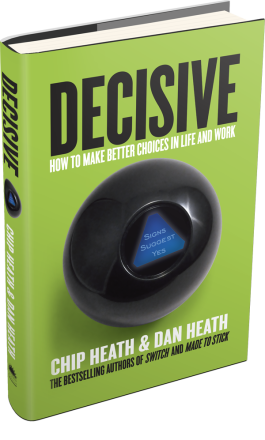
Every day is filled with choices. Many are small and inconsequential. Some are life changing. This month’s book suggestion was written to improve our decision-making ability.
As I was reading this book, I thought back on some of the key decisions in my life. At age 10, I chose to place my faith in Jesus to save me. At age 18, I asked the most beautiful angel-voiced blonde on our first date. Later that year, I decided to attend Murray State University (go Racers!). Four years later, I decided to enlist in the Marine Corps. One year later, I proposed to that beauty I mentioned before.
All of these decisions worked out for me. So many others did not. I am not going to share that list with you.
So whether you are deciding where to eat tonight, or when and if to propose to your girl (congrats little bro!), you go through the following steps.
- You have a choice.
- You consider your options.
- You make your choice.
- You live with/suffer the consequences.
The Heath brothers do a masterful job at describing what they call the four villains to decision-making. They coincide with the four steps above.
- Narrow framing – you don’t consider near enough options – often stopping as soon as you have two.
- Confirmation bias – you gather self-serving information to support your natural bias.
- Short-term emotion – you allow the heat of the moment to overly influence the decision you make.
- Overconfidence – your optimism for the future allows you to be caught off-guard when things go south.
To counter these “villains,” the Heath brothers put forth a very clever and easy to remember acronym – W.R.A.P.
- W – Widen your options. Refuse to limit yourself to a “whether or not” choice.
- R – Reality test your assumptions. Someone somewhere has faced your situation. Find them. See what they did.
- A – Attain distance. Sleep on it. Clarity is often found on the other side of a pillow. Don’t let yourself make a decision when you are emotionally charged. If you are older than 12, you can think of at least 3 times immediately when you did not head this advice.
- P – Prepare to be wrong. This is just good business. If you are a golf fan, notice how the elite golfer stays away from the big trouble spots. They have good misses that do not cripple them. Force yourself to prepare for the worst-case scenario.
The Heath brothers spend the rest of the book sharing story after story demonstrating the power of this process. In fact, their premise for the book is that it is the process of making a decision that has the most impact on the quality of the decision.
This book is incredibly clever and entertaining. It had me page-turning. I was so intrigued that I’ve shared this process of decision-making with my coaching clients, my family, and many of my friends. I believe it is powerful. I believe that this book can have a powerful impact on your future. Do yourself a favor and decide to read this book.









